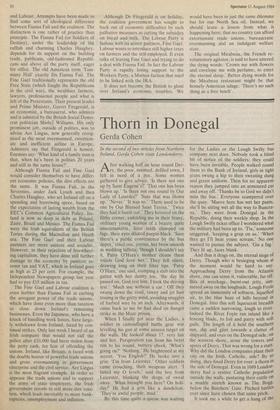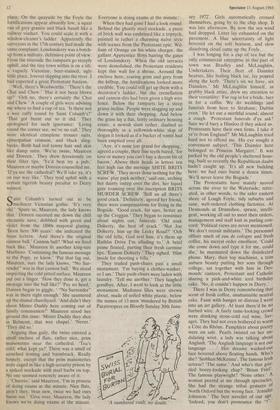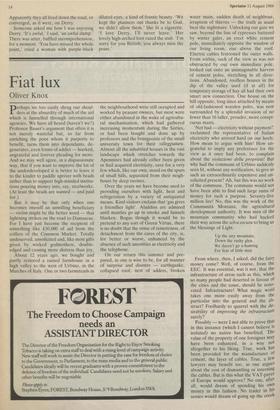Thorn in Donegal
Gerda Cohen
In the second of two articles from Northern Ireland, Gerda Cohen visits Londonderry.
After walking half an hour round Der- ry, the poor, maimed, defiled town, I felt in need of a pee. Some women gathered to give advice. 'Is there not one up by Saint Eugene's?' That one has been blown up.' Is there not one round by Our Lady of Lourdes?' Sure that was blown up.' Never."It was so.' There used to be one by Our Blessed Saint Teresa.' Twice they had it burnt out.' They hovered on the filthy corner, enfolding me in their litany, ordinary young women of a beauty quite unaccountable, feral teeth clamped on fags, their eyes dilated purple-black. 'Sure there's a public convenience by the bus depot,' cried one, joyous, her brow smooth as wedding taffeta; 'though I shouldn't say it, Patsy O'Hara's mother cleans them toilets God love her.' They fell silent, drawing long on their filter tips. 'Patsy O'Hara,' one said, stamping a stub into the gutter with her dainty toe, 'the day he passed on, God rest him, I took the driving test.' Much use without a car.' Off they swung down the road, tawny and jet hair tossing in the gritty wind, avoiding snaggles of barbed wire by an inch. Afterwards, it came back to me he had died on hunger strike in the Maze prison.
When I finally got near the Ladies, a soldier in camouflaged battle gear was levelling his gun at some unseen target on the walls. He looked about 17, very fair and hot. Perspiration ran from his beret rim to his round, buttery cheek. 'What's going on?' Nothing.' He brightened at my accent. 'You English?' He broke into a grin: 'I'm from Leicester.' Other soldiers came crouching, their weapons alert. 'I failed my 0 levels,' said the boy from Leicester, blinking the drops of sweat away. 'What brought you here? On holi- day!' He had a grin like a dandelion. 'They're awful people, mad.'
By this time quite a queue was waiting for the Ladies or the Lough Swilly bus company next door. Nobody took a blind bit of notice of the soldiers; they could have been invisible. People walked round them to the Bank of Ireland, girls in tight jeans swung a hip to their sweating dung and green uniform. Then for no apparent reason they jumped into an armoured car and away off. 'Thanks be to God we didn't miss the bus.' Everyone scampered over the quay. `Maeve here has wet her pants, she'll be sitting wet all the way to Buncra- na.' They were from Donegal in the Republic, doing their weekly shop. In the Lough Swilly ticket office I wondered what the military had been up to. 'Tta,' someone sniggered, 'keeping a grup on us.' When they go I'll hear youse scream.' No one wanted to pursue the subject. `Gis a fag.' They lit up, faces blank.
And thus it drags on, the eternal siege of Derry. Though who is besieging whom at the moment would be hard to say. Approaching Derry from the Atlantic shore, one can sense it, vulnerable, far off. Bits of wreckage, burnt-out jetty, sim- mered away on the loughside. Lough Foyle spread an immensity of softness, liquefied air, to the blue haze of hills beyond in Donegal. Into this soft liquescent breadth came a sudden narrowing, lough to river. Indeed the River Foyle ran inland like a fencing blade, to foil and parry with soft guile. The length of it held the southern sun, dip and glint towards a clutter of shipyard, and over on the Donegal side, on the western shore, arose the towers and spires of Derry. That was wrong for a start. Why did the London companies plant their city on the Irish, Catholic, side? By so doing, they fixed Derry for ever: a thorn in the side of Donegal. Even in 1689 London- derry had a restive Catholic population outside the walls, pasturing their cattle on a muddy stretch known as The Bogg, below the Butchers' Gate. Pitched battles ever since have chosen that same pitch.
It took me a while to get a hang of the place. On the quayside by the Foyle the fortifications appear absurdly low, a squat run of grey granite and black basalt like a railway viaduct. You could scale it with a window-cleaner's ladder. Apparently the surveyors in the 17th century had made the same complaint. Londonderry was a botch- up from a military, defensive point of view. From the riverside the ramparts go steeply uphill, and the tiny town within is on a tilt; a vaguely Victorian, beer-stained, ugly little place, forever slipping into the river. I had expected a great Protestant bastion.
'Well, there's Woolworths.' There's the Chat and Chew.' Has it not been blown up?' Och no, there's certainly the Chat and Chew.' A couple of girls were advising me where to find a cup of tea. 'Is there not a wee taffy round by Saint Columb's?' 'That got burnt out so it did.' They apologised for such ignorance: 'Living round the corner see, we've no call.' They wore identical crimplene trouser suits, episcopalian crimson, and black sling- backs. Both had red tawny hair and skin like damp satin. 'We're twins; Maureen and Doreen.' They drew ferociously on their filter tips. 'Ye'd best try a pub,' Maureen or maybe Doreen counselled me. 'D'ya see the cathedral? We'll take ya, it's on our way like.' They trod uphill with a certain tigerish beauty peculiar to Derry women.
Saint Columb's turned out to be mediocre Victorian gothic. 'It's very old.' Spare us, Maureen, the lady knows that.' Doreen escorted me down the chill encaustic nave, dribbled with green and violet from the 1890s mayoral glazing. 'Been here 300 years': she indicated the brass lectern. 'And there's the original cannon ball.' Cannon ball? 'What we fired back like.' Maureen lit another king-size Marlboro. 'Containing the famous message to the Pope, ye know.' Put that fag out, Maureen, sure the lady knows. "No Sur- render" was in that cannon ball.' We stood inspecting the cold pitted surface. Maureen put out a finger. 'How they done it, get a message into the ball like?' Pay no heed,' Doreen began to giggle, "No Surrender" was in there right enough.' She sauntered up the dismal churchyard. 'And didn't they shoot Mister Duddy here coming out of family communion?' Maureen stood her ground this time: 'Mister Duddy they shot in Belmont, that wee chapel.' Never.' 'They did so.'
Arguing thus gaily, the twins entered a small enclave of flats, rather nice, prim maisonettes near the cathedral. 'Tea's cold; what kept ya?' There was a smell of scorched ironing and barmbrack. Really homely, except that the prim maisonettes were caged in like a high-security prison by a spiked stockade with steel barbs on top. No one seemed remotely aware of it.
'Cheerio,' said Maureen, 'I'm in process of doing exams at the minute. Nice flats, aren't they, bran new, twice we had ours burnt out.' Give over, Maureen, the lady knows we're doing exams at the minute. Everyone is doing exams at the minute.'
When they had gone I had a look round. Behind the ghastly steel stockade, a piece of brick wall was enshrined like a triptych, painted in rather a charming naïve style with scenes from the Protestant epic: Wil- liam of Orange on his white charger, the gallant Apprentice Boys barring the gates of Londonderry. When the old terraces were demolished, the Protestant residents kept this wall for a shrine. Around the enclave here, rearing grim and grey from the hilltop, the fortifications looked more credible. You could still get up them with a decorator's ladder, but the crenellation and cannon slits had been given a high wire fence. Below the ramparts lay a steep grassy incline. People were slogging up and down it with their shopping. And below the grass lay a flat, fairly ordinary housing estate, a newish slum rather, daubed so thoroughly in a yellowish-white slop of slogan it looked as if a bucket of vomit had been emptied over all.
'Aye, it's none too grand for shopping,' agreed a couple, their fine teeth bared, 'for love or money you can't buy a decent bit of bacon.' Above their heads in letters ten feet high ran the message SHITE BRITS SCREW. 'They never done nothing for the wains' play park neither,' said one, arching her dainty instep over the dirt, her liquid gaze roaming over the inscription BRITS MURDER SCREW. 'Still an all there's good crack.' Definitely, agreed her friend, there were compensations for living in the Bogside. 'Good crack, for sure, better an up the Creggan.' They began to reminisce about nights out, funerals: 'Old soak Doherty, the best of crack ."Not Joe Doherty, him up the Lecky Road?' Och the old fella, God rest him, it's them up Rathlin Drive I'm alluding to.' A brief pause floated, parting their fresh carmine lips. 'Eamon Doherty.' They sighed. 'Him inside for shooting a fella.'
They trailed push-chairs past a small monument. `I'm buying a clothes-washer, so I am.' Their push-chairs were laden with laundry. 'Tell me another.' They laughed goodbye. After, I went to look at the little monument. Madonna lilies were strewn about, made of soiled white plastic, below the names of 13 men 'murdered by British Paratroopers on Bloody Sunday 30th Janu-
'A numbered vault, no doubt.' ary 1972'. Girls automatically crossed themselves, going by to the chip shop. It was late afternoon. By now the sea wind had dropped. Litter lay exhausted on the pavement. A blue uncertainty of light hovered on the soft horizon, and slow dissolving cloud came up the Foyle.
I was longing for a cup of tea but the only commercial enterprise in this part of town was Bradley and McLaughlin, Undertakers. Their fleet of Daimler hearses, like boiling black tar, lay poured along the kerb. 'There's six we have, six Daimlers.' Mr McLaughlin himself, in grubby black attire, drew my attention to their versatility: 'Fur rug in for a bride, bier in for a coffin. We do weddings and funerals from here to Strabane; Dublin even.' He let out a mirthful sound, almost a cough. 'Protestant funerals d'ya ask? Sure we'd bury a Hindoo if they asked us. Protestants have their own firms. I take it ye're from England?' Mr McLaughlin tried hard not to offend me. His eye sought a convenient subject. 'This Daimler here belonged to Princess Margaret.' It was parked by the old people's sheltered hous- ing, built so recently the Republican daubs hadn't caught up. 'It's all new building here: we had ours burnt a dozen times. We'll never leave the Bogside.'
The Protestants have mainly moved across the river to the Waterside; retre- ated, in other words, to the safer eastern shore of Lough Foyle, tidy suburbs and sane, well-ordered clothing factories. At Desmonds at Drumshoe, spruce, intelli- gent, working all out to meet their orders, management and staff knit in purling con- cord: 'Political views are never mentioned. We don't recruit militants.' The personnel officer smelt of eau de cologne and fresh coffee, his merest order emollient. 'Could she come down and type it for me, could she,' he murmured down the disinfected phone. Mary, their top machinist, a trim auburn beauty putting her sons through college, sat together with him in Des- monds' canteen, Protestant and Catholic sharing a pink-and-white iced birthday cake. `No, it couldn't happen in Derry.' There I was in Derry remembering that scent of fresh coffee, unattainable neutral cake. Faint with hunger or distress I went into an art gallery. At least there'd be no barbed wire. A fairly tame-looking crowd were drinking stone-cold red wine. Sav- ages. They had not even bothered to warm a Cote du Rhone. Pamphlets about poetry were on sale. Pearls twisted on her un- dulating wrist, a lady was talking about Anglush. 'The Anglush language is not our language . . .' Her dreamy washed-out face hovered above floating hands. Who's she? `Siobhan McKenna'. The famous Irish actress? 'The same.' And who's that griz- zled boozy-looking chap? 'Brian Friel • The famous playwright? 'None other.' A woman peered at me through spectacles. She had the strange tribal gestures of North Oxford but the wrong face. 'Jennifer Johnston.' The best novelist of our age; 'Indeed; you don't pronounce the "t •
Apparently they all lived down the road, or converged, as it were, on Derry.
Someone asked me how I was enjoying Deny. 'It's awful,' I said, 'an awful dump.' There was utter, baffled incomprehension, for a moment. 'You have missed the whole point,' cried a woman with purple-black dilated eyes, a kind of frantic beauty. 'We kept the planners out thanks be to God, we didn't allow them.' She lit a cigarette. 'I love Derry. I'll never leave.' Her lovely high-arched foot razed the stub. 'I'm sorry for you British; you always miss the point.'








































 Previous page
Previous page